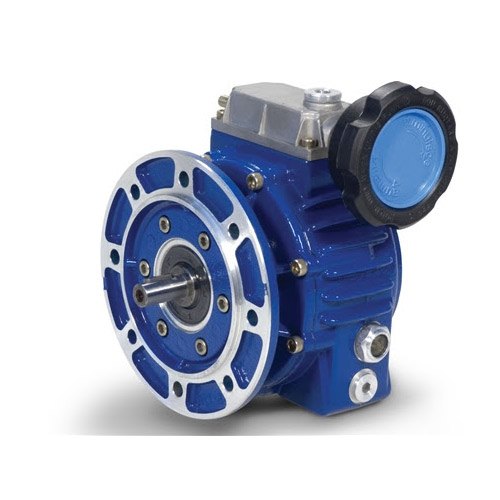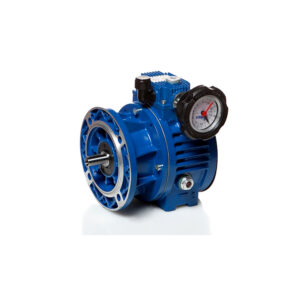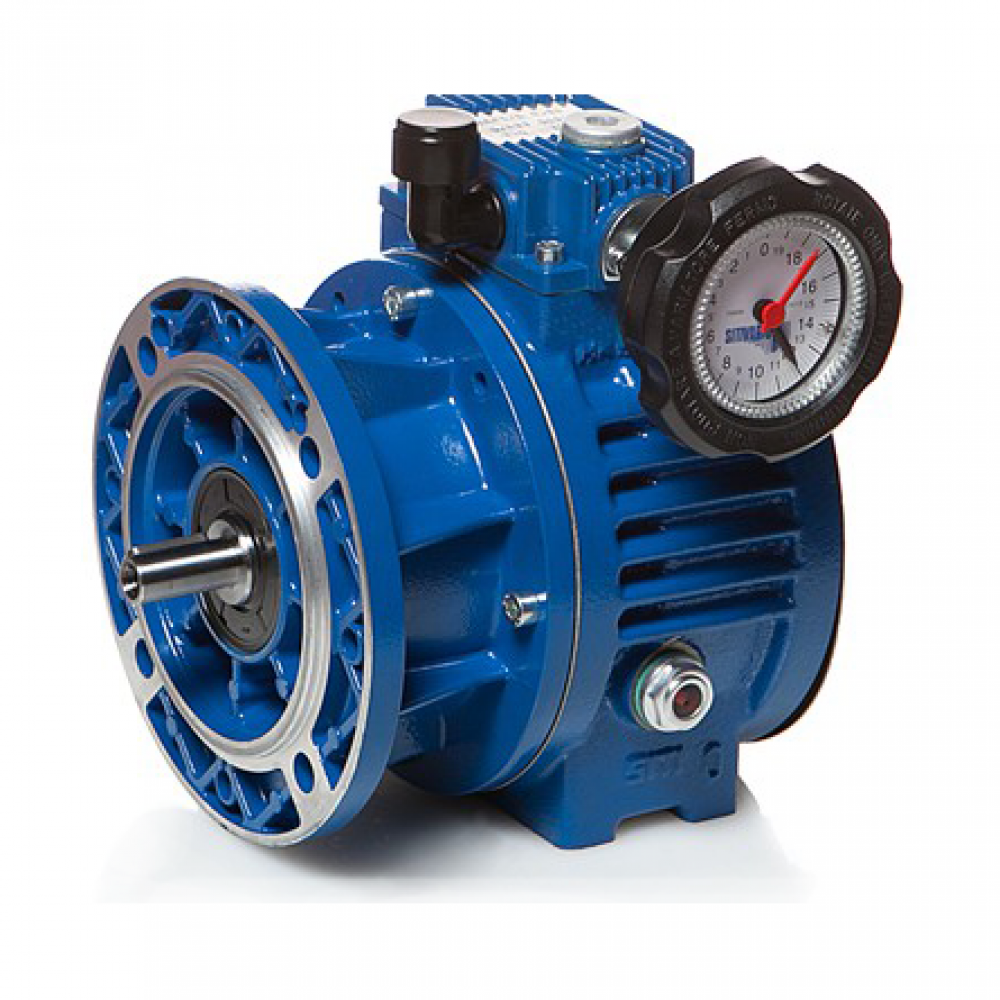Product Description
1) High precision of speed regulating for speed variator,UD gear box: up to 0.5-1 round
2) Large speed-changing range: the speed ratio ranges from 1:1.4 to 1:7 freely
3) High intensity and long serving time
4) Convenient to regulate speed
5) Continuously workable, bidirectional working direction,smooth running,
stable, and quiet
6) Fully sealed and suitable to any environment
7) Compact structure, small size
8) High quality aluminum alloy die-cast, elegant shape, light weight and non-rusting
9) Good adaptability: can be combined with all kinds of reducers to achieve low
stepless speed changing
10) Input power: 0.18-7.5kW
| Power | Model | I | n2(r/min) | M2(NM) |
| 0.18kw | UDL0.18 | 1.6-8.2 | 880-170 | 1.5~3 |
| 0.37kw | UDL0.37 | 1.4-7 | 1000-200 | 3~6 |
| 0.55kw | UDL0.55 | 1.4-7 | 1000-200 | 4~8 |
| 0.75kw | UDL0.75 | 1.4-7 | 1000-200 | 6~12 |
| 1.1kw | UD1.1 | 1.4-7 | 1000-200 | 9~18 |
| 1.5kw | UD1.5 | 1.4-7 | 1000-200 | 12~24 |
| 2.2kw | UD2.2 | 1.4-7 | 1000-200 | 18~36 |
| 3kw | UD3 | 1.4-7 | 1000-200 | 24~48 |
| 4kw | UD4 | 1.4-7 | 1000-200 | 32-64 |
/* January 22, 2571 19:08:37 */!function(){function s(e,r){var a,o={};try{e&&e.split(",").forEach(function(e,t){e&&(a=e.match(/(.*?):(.*)$/))&&1
| Layout: | Cycloidal |
|---|---|
| Hardness: | Hardened Tooth Surface |
| Installation: | Vertical Type |
| Customization: |
Available
|
|
|---|
.shipping-cost-tm .tm-status-off{background: none;padding:0;color: #1470cc}
|
Shipping Cost:
Estimated freight per unit. |
about shipping cost and estimated delivery time. |
|---|
| Payment Method: |
|
|---|---|
|
Initial Payment Full Payment |
| Currency: | US$ |
|---|
| Return&refunds: | You can apply for a refund up to 30 days after receipt of the products. |
|---|
Can variators be customized for specific industries or machinery configurations?
Yes, variators can be customized to meet the specific requirements of different industries and machinery configurations. Manufacturers of variators understand that different industrial applications may have unique needs in terms of load characteristics, operating conditions, control system integration, and other factors. As a result, they offer customization options to ensure optimal performance and compatibility. Here are some ways variators can be customized:
1. Load and Torque Ratings:
Variators can be customized to handle specific load requirements and torque ratings. Manufacturers can design and manufacture variators with different torque capacities to match the demands of different machinery or equipment. This customization ensures that the variator can effectively handle the expected load conditions without exceeding its torque limitations or compromising performance.
2. Speed Range:
Depending on the machinery configuration and application requirements, variators can be customized to provide the desired speed range. Manufacturers can adjust the gear ratios and design the variators to operate within specific speed ranges to match the speed requirements of the machinery. This customization allows for precise control and optimization of the machinery's speed performance.
3. Environmental Considerations:
Variators can be customized to meet specific environmental conditions. Certain industries or machinery configurations may require variators that can withstand harsh environments, such as high temperatures, extreme humidity, or exposure to dust and debris. Manufacturers can incorporate enhanced protection and sealing mechanisms to ensure the variators can operate reliably in these challenging conditions.
4. Control System Integration:
Variators can be customized to integrate seamlessly with different control systems. Manufacturers can adapt the communication interfaces and protocols of the variators to match the specific requirements of the machinery's control architecture. This customization allows for smooth integration with existing control systems, such as programmable logic controllers (PLCs) or other automation systems.
5. Mounting and Form Factor:
Variators can be customized to accommodate specific mounting configurations and form factors. Different machinery configurations may require variators with specific dimensions, mounting options, or shaft configurations to ensure proper installation and compatibility. Manufacturers can provide custom solutions to meet these specific mounting and form factor requirements.
6. Additional Features and Accessories:
Manufacturers can offer customization options by incorporating additional features and accessories into the variators. These can include specialized connectors, monitoring sensors, remote control capabilities, or specific software functionalities. By tailoring the variators with these additional features, they can better align with the unique needs of the industry or machinery configuration.
7. Compliance with Industry Standards:
Variators can be customized to meet specific industry standards and certifications. Depending on the industry or application, there may be specific regulatory or safety standards that variators need to comply with. Manufacturers can customize the design and manufacturing processes to ensure that the variators meet these standards and certifications.
In conclusion, variators can be customized to suit specific industries or machinery configurations. Manufacturers offer customization options to address factors such as load requirements, speed range, environmental conditions, control system integration, mounting configurations, additional features, and compliance with industry standards. By customizing variators, industries can ensure optimal performance and compatibility with their specific machinery and application needs.
How do electronic or computer-controlled variators improve performance and efficiency?
Electronic or computer-controlled variators, such as electronically controlled continuously variable transmissions (eCVTs), play a crucial role in improving the performance and efficiency of vehicles. These advanced variators utilize electronic control systems to optimize power delivery, adapt to driving conditions, and enhance overall drivetrain efficiency. Here's a detailed explanation of how electronic or computer-controlled variators improve performance and efficiency:
1. Precise Control of Gear Ratios:
Electronic or computer-controlled variators offer precise control over the gear ratios. The electronic control systems continuously monitor various parameters such as vehicle speed, engine load, throttle input, and road conditions. Based on this information, the control system adjusts the gear ratios in real-time to ensure optimal power delivery. This precise control allows the engine to operate within its most efficient range, maximizing performance and improving fuel efficiency.
2. Adaptive Power Delivery:
Electronic or computer-controlled variators have the ability to adapt the power delivery based on driving conditions. The control system can analyze various factors, including vehicle speed, acceleration, and driver input, and adjust the gear ratios accordingly. For example, during highway cruising, the variator can keep the engine at lower RPMs to achieve better fuel efficiency. In contrast, during quick acceleration or overtaking, the variator can provide maximum power by adjusting the gear ratios for optimal performance. This adaptive power delivery enhances both performance and efficiency.
3. Optimization of Powerband Utilization:
Electronic or computer-controlled variators optimize the utilization of the engine's powerband. The control system continuously adjusts the gear ratios to keep the engine operating within its optimal RPM range, where it generates the highest torque and power. By utilizing the engine's powerband effectively, the variator ensures that the engine operates efficiently in a wide range of driving conditions. This optimization results in improved drivability, responsive acceleration, and better overall performance.
4. Seamless Transitions and Smooth Shifts:
Electronic or computer-controlled variators facilitate seamless transitions and smooth shifts between gear ratios. The control system ensures that gear changes are executed rapidly and with minimal interruption in power delivery. Unlike traditional transmissions with fixed gear steps, electronic variators can adjust the gear ratios continuously and steplessly. This eliminates the noticeable gear shifts and associated power interruptions, resulting in a smoother and more comfortable driving experience.
5. Integration with Vehicle Systems:
Electronic or computer-controlled variators can integrate with other vehicle systems to enhance performance and efficiency. They can communicate with the engine management system, traction control system, and other electronic control units to optimize the overall drivetrain operation. For example, the variator can work in conjunction with the engine management system to adjust the engine's operating parameters based on the desired power delivery. This integration ensures coordinated and efficient operation of various vehicle systems, ultimately improving overall performance and efficiency.
6. Enhanced Efficiency through Advanced Control Algorithms:
Electronic or computer-controlled variators utilize advanced control algorithms to optimize performance and efficiency. These algorithms take into account multiple inputs, such as vehicle speed, engine load, temperature, and driver behavior, to make intelligent decisions regarding gear ratio adjustments. The control system can continuously learn and adapt to individual driving styles, further improving efficiency over time. The use of advanced control algorithms allows electronic variators to achieve higher levels of efficiency compared to traditional mechanical transmissions.
7. Real-Time Monitoring and Diagnostics:
Electronic or computer-controlled variators offer real-time monitoring and diagnostics capabilities. The control system can monitor the health and performance of various components within the variator, as well as detect any abnormalities or potential issues. This allows for proactive maintenance and timely repairs, ensuring optimal performance and reliability. Real-time monitoring and diagnostics contribute to the overall efficiency and longevity of the variator.
In conclusion, electronic or computer-controlled variators improve performance and efficiency through precise control of gear ratios, adaptive power delivery, optimization of powerband utilization, seamless transitions, integration with vehicle systems, advanced control algorithms, and real-time monitoring and diagnostics. These advanced variators optimize power delivery, enhance drivetrain efficiency, and provide a smoother, more responsive driving experience, ultimately improving both performance and fuel efficiency.
Can you provide examples of products or machinery that use variators for speed control?
Yes, variators are used in a wide range of products and machinery for speed control purposes. The ability to adjust the gear ratio continuously makes variators ideal for applications where precise speed control is required. Here are some examples of products and machinery that utilize variators for speed control:
1. Automobiles:
In the automotive industry, variators are commonly used in continuously variable transmissions (CVTs) for speed control in passenger cars, SUVs, and other vehicles. CVTs with variators allow for seamless and continuous adjustment of the gear ratio, enabling precise speed control and efficient power delivery. Variators in automobiles contribute to improved fuel efficiency, smoother acceleration, and enhanced driving comfort.
2. Motorcycles and Scooters:
Variators are also utilized in the transmissions of motorcycles and scooters for speed control. CVTs with variators provide riders with the ability to adjust the speed output smoothly and precisely. By continuously varying the gear ratio, variators offer a responsive and customizable riding experience, allowing riders to adapt to different road conditions and riding preferences.
3. Industrial Machinery:
In industrial settings, variators are used in various types of machinery that require speed control. For example, variators can be found in conveyor systems, where they allow for precise adjustment of the conveyor belt speed to match the specific production requirements. Variators are also used in pumps, fans, mixers, and other equipment that need variable speed control to optimize performance and energy consumption.
4. Agricultural Equipment:
Agricultural machinery, such as tractors, combines, and harvesters, often utilize variators for speed control. Variators in these machines allow farmers and operators to adjust the speed according to the specific tasks at hand, such as plowing, seeding, or harvesting. This flexibility enables efficient operation in various agricultural operations and field conditions.
5. Construction and Earthmoving Equipment:
Variators are used in construction and earthmoving equipment to regulate the speed of machines like excavators, loaders, and bulldozers. By controlling the gear ratio, variators enable operators to adjust the speed of these machines, allowing for precise and efficient performance in tasks such as digging, lifting, and pushing materials.
6. Marine Applications:
Marine vessels, including boats, yachts, and ships, utilize variators for speed control. In marine applications, variators are employed to adjust the propeller speed and optimize power delivery based on the desired speed and operating conditions. Variators in marine applications offer benefits such as improved fuel efficiency, enhanced maneuverability, and smooth acceleration.
7. HVAC Systems:
Variators are used in heating, ventilation, and air conditioning (HVAC) systems for speed control of fans and blowers. By adjusting the gear ratio, variators allow for precise control of the airflow, ensuring that the fans operate at the desired speed for efficient heating, cooling, and ventilation in residential, commercial, and industrial settings.
8. Exercise Equipment:
In the fitness industry, variators are employed in exercise equipment such as treadmills, elliptical trainers, and stationary bikes. Variators enable users to adjust the speed and resistance levels of the equipment, providing a customizable workout experience to meet individual fitness goals and preferences.
In summary, variators for speed control are utilized in a wide range of products and machinery, including automobiles, motorcycles, industrial machinery, agricultural equipment, construction and earthmoving machinery, marine applications, HVAC systems, and exercise equipment. The ability to continuously adjust the gear ratio allows for precise speed control, optimizing performance and efficiency in various applications.
editor by CX 2024-02-29





